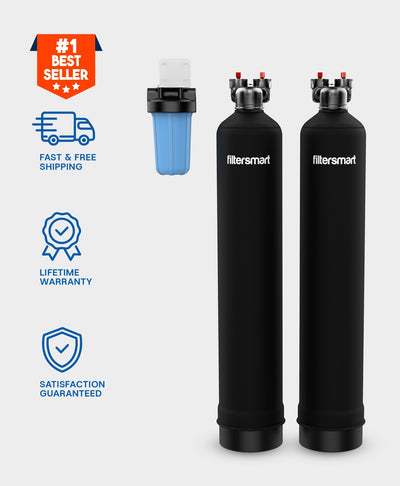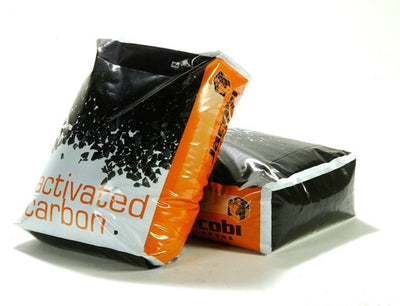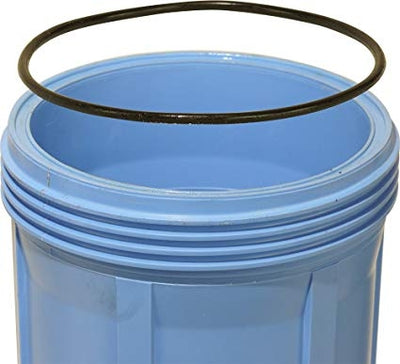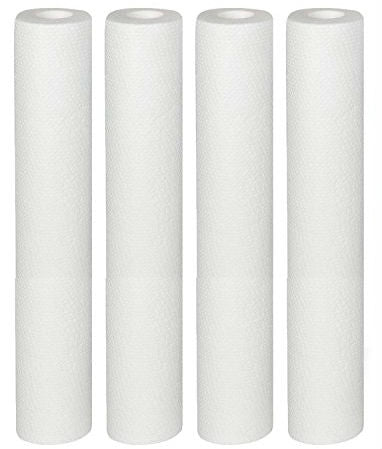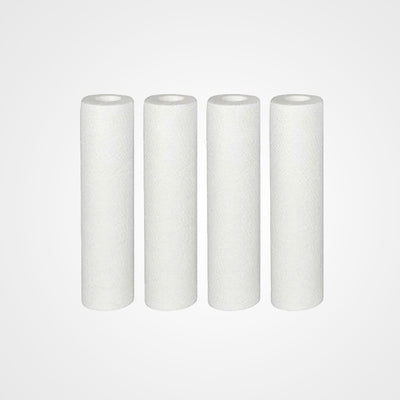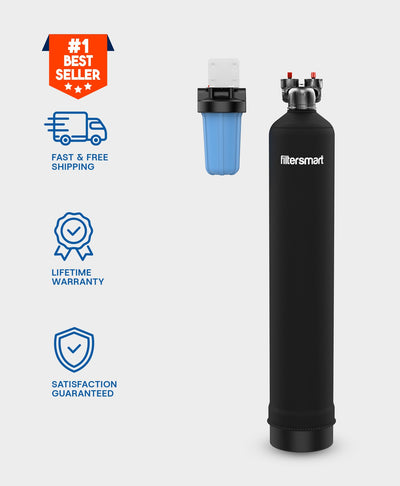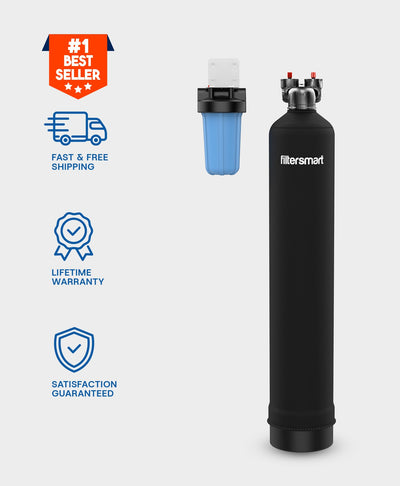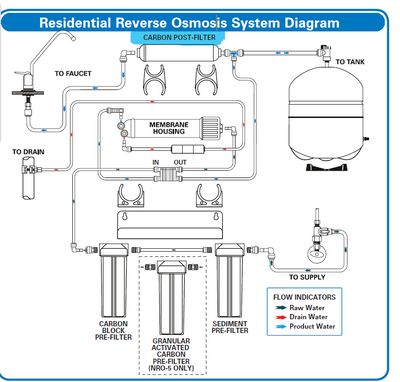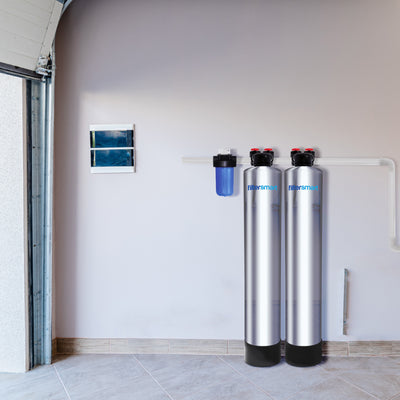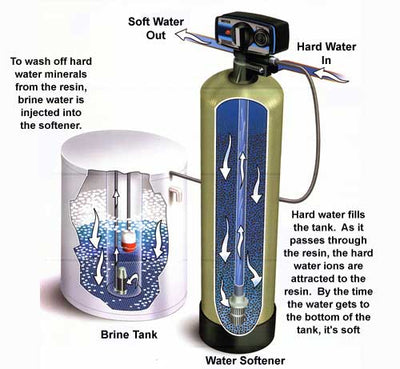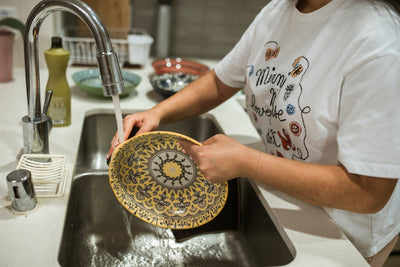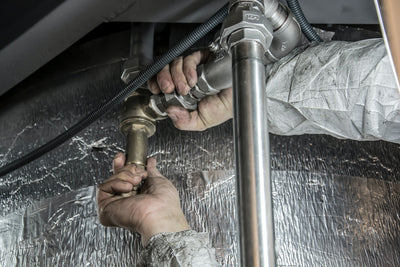Which one do you need for your home?
Going through all of the information on the internet about water filters and water softeners can be exhausting. We want to make it as simple as possible for you. Chances are, if you live in one of the85% of cities that has a hard water problem in the United States, you needboth a water softener and a water filter.
Here’s why.
What’s the Difference Between Water Softening and Water Filtration?
A water filter removes many unwanted compounds from your water. That definitely includes dirt, sand, sediment, and other large particles. Depending on the quality of the filter, it could also include fluoride, pesticides, iron, sulfur, and chlorine. If you’ve ever gone on a hike or a camping trip and you or someone you knew brought along one of those straws that they could safely drink water through --thatis a filter. It removes a lot of the stuff you don’t want out of your drinking water, particularly the big stuff that might otherwise damage your body or your reverse osmosis system. Specific filters are designed for specific substances.
Carbon filtration, like the Jacobi carbon thatour FilterSmart systems use, effectively reduces chlorine, odor, and volatile organic compounds. For example, the University of Nebraska-Lincoln says, “activated carbon filtration is an effective method for treating certain organic compounds, unpleasant tastes and odors, and chlorine.”
So, at this point, you know that water filters remove certain contaminants from your water supply -- and that water softeners remove hard water. Check yourConsumer Confidence Report from your public water supplier.
On the other hand, a water softener softens hard water. That might sound a little redundant at first, but here’s how it works: In some ways, a water softener is just a water filter specifically for hard water, which is water that has high amounts of magnesium and calcium in it.Through a variety of processes, water softeners either remove those hardness ions or change the way that they interact with surfaces.
So, a water softener is a type of water filter, but not all water filters are water softeners. A water softener is simply a hard water filter.

Water Softener vs. Whole House Filter
So, now that you know the difference between a water softener and a water filter, what’s the difference between a water softener and awhole housewater filter?
Many people have water filters installed in their kitchens, like a small reverse osmosis system, but not at every tap in the home (every point-of-use or PoU). A whole house water filter is installed at the point-of-entry, or PoE. That means that every single tap in your home will be free from the contaminants that the filter is designed to reduce.
As we mentioned above, in order to decide on whether you need a water filter or water softener (or both), check yourConsumer Confidence Report to see the chemicals that are floating through your public water supply, and then buy the product that’s right for you. If you have hard water and a chloramine problem, you might look into buying something like theFS1000Pro, which is designed for maximum chloramine removal. If you don’t have any traces of hard water, though, you might not even look into buying a water softener at all.
What Exactly Do the Different Types of Water Softeners and Water Filters Remove? The Best Water Filters and Water Softeners for Your Issues...
In this section, we’ll give you an easy-to-follow problem and solution guide for common water problems.
For example, if you have dry skin and mild limescale build-up, then simply look into buying a salt-free water softener…
-
Dry skin, limescale build-up, white spots on dishes… buy a no-salt water softener.
-
Cloudy, impure water… buy a water filter.
-
Rotten egg odor, rust stains (usually associated with well water)... look into an iron filtration system.
-
Chlorine, chloroform, chloramines, chemical odors… consider buying an activated carbon filtration system.
-
A lot of toxins and organic compounds, including nitrites and nitrates… a reverse osmosis system may be right for you.
Also, check out our in-depth guide to buying the right whole house water filtration system.
This list is by no means exhaustive. Chances are that you have a mix of water issues. It’s unlikely that just one product will solveall of your problems.

Do You Need a Water Softener if You Have a Whole House Filter?
Is it necessary to get both a whole house water filteranda water softener? If a whole house water filter does what it says --filters all of the water in the house, wouldn’t that include magnesium and calcium, the same stuff that makes up hard water? Would you still need a water softener or would it be redundant?
Again, it depends on the type of whole house water filter you buy. If youlook into getting a whole house water filter that also works as a water softener, then of course it’s going to remove both hard water and other unwanted compounds.
The short answer is that, if you want a total solution to virtually all of your water issues, it’s a good idea to get both a water softener and a whole house filter.
Let’s say you get a whole house water filter that’s rated at 30-50 microns. That’s about the size of a piece of dust or human hair, so you might assume that the filter is going to capture any magnesium and calcium in the supply.
However, trace amounts of sediment can be much smaller than 30-50 microns, so you might experience issues regardless.
Similarly, if you only buy a water softener and your public water supply review has revealed some issues with protozoa, bacteria, and viruses, you’ll want to buy a whole house water filter that’s specifically designed for removing those biological contaminants, because ion exchange water softeners aren’t good at that sort of thing. When in doubt, consult theCDC guide on which filters are effective for certain contaminants.
Is There Any Alternative to Water Softener-Salt-Free Water Conditioners
If you don’t want to purchase a water softener but still need a solution to eliminate scale buildup from water, you may buy a salt-free water conditioner. It can be an alternative to water softener and help you make your home more environmentally safe and friendly.
A salt-free water conditioner is different from salt-based softener and doesn’t dematerialize water by removing minerals chemically. Also, it doesn’t put excess or additional chemical and salt waste into your environment. In fact, a salt-free water conditioner comes with scale control media technology to reduce harsh buildup on pipes naturally without using any chemicals or salt.
Does Buying Water Filter is a Good Choice?
While a water softener is an excellent machine to protect your dig from hard water scale buildup and its effects, a premium quality water filter purifies water. And that is typically more important. It doesn’t here; if you’ve other problem with drinking water such as bacterial contamination, chlorination, or iron staining, consider buying a whole house filter. It will treat all specific concerns.
It is quite common for many homeowners to invest in both house water fitter and softener to treat incoming water properly. However, water filtration often offers total solution and provides complete filtration. When you purchase an ergonomic and quality house filter, it works efficiently and becomes a great investment for your home improvement.
It not only provides clean pure drinkable water but also protects your home and health from hazardous chemicals and containments.
Does Filtration Works Better and Harder Than a Softener?
A quality water filter does just more than eliminating the calcium from drinking water. We say this because when you run drinking water through a water filter, you get water that has no harmful contaminants such as chloramines, chlorine, and harmful VOCs.
For instance, chlorine is a common chemical that is used to remove impurities from municipal water for more than 80 years. However, a study conducted in 1970s showed that chlorinated water forms Trihalomethanes (by-products of chlorine). It happens due to the combination of chlorine with some naturally-occurring organic matter including algae and vegetation.
Later, the American Journal of Public Health found that consuming chlorinated water may increase risk for cancer (certain types). The reported also showed that most of these harmful effects were because of taking bath in chlorinated water.
Researchers are still finding more evidence to study the effects of chlorinated water on human body. Filters, in this regard, are certified machines for the removing of chlorine from the water. At its core, experts consider it a better choice to avoid significant risks associated to consuming chlorinated water.
Quick Q&A for Water Softener vs. Water Filter
In case you just want a quick resource for your questions regarding water softeners, we’ve given you the top three here…
What Does a Water Softener Remove? Is it a water purifier?
Water softeners typically only remove magnesium and calcium, but some, like the FS1000Pro, are designed to do more: like remove chloramine (chlorine, ammonia, etc).
Do Water Softeners Filter Water?
Yes, but only for specific contaminants that you’re either trying to get rid of entirely (through the process of ion exchange) or to change the properties of (through the process of template-assisted crystallization).
Does a Water Softener Remove Chlorine?
Not all water softeners remove chlorine, but ones that utilize activated carbon, like ours, do. Water softener typically softens the effects of chemicals present in the water. That is why buying a water softener that uses carbon is a wise choice to make water chlorine free.
Conclusion: Water Softener vs. Water Filter
Water filters sort out different contaminants based on what the filter media is designed to attract. A water softener is a type of water filter that’s designed to remove or negate the effects of magnesium and calcium in hard water.
Chances are you have a host of water problems, so one solution may not be enough to take care of every problem that you encounter.
Every year by July 1st, your local water supplier should send you a water quality report. If you happen to keep those on file (or if you find it byfollowing this link), it’s a useful guide to poke through in order to find out what chemicals might be floating around in your water.
Then, feel free to either come back to this article or to contact a FilterSmart representative to see which products are going to benefit you. Generally, most people benefit from a whole house water filter and, if they encounter hard water problems like most of the continental United States, a water softener.







